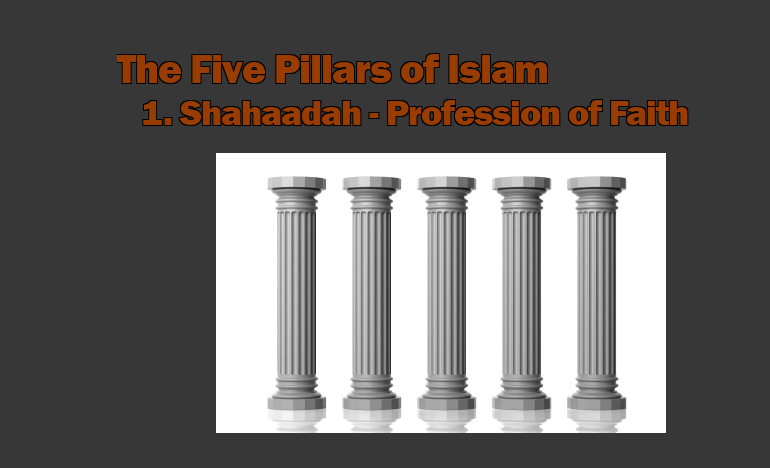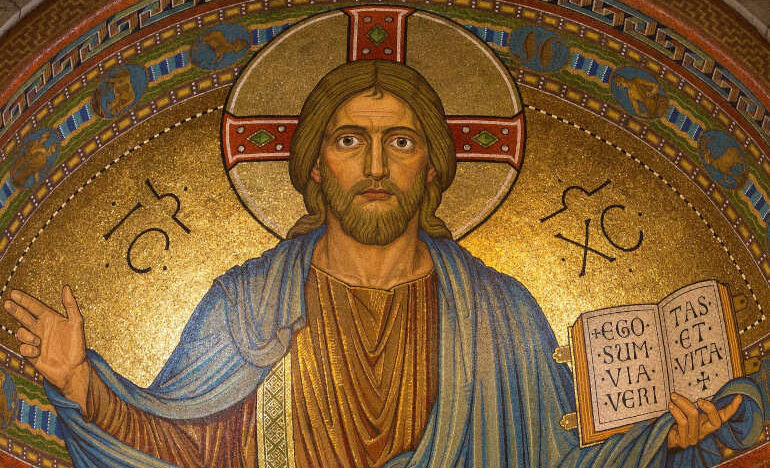Embracing the Mystery of God: The First Pillar of Islam

By Kathy Keary
Part 9. The full series is here: The Contemplative Spirit of Islam.
When Christians recite the Nicene Creed, they are not only stating a laundry list of convictions, they are also proclaiming the essence of who they are. I prefer to begin the prayer with “I embrace” rather than “I believe” because it gives voice to the significance the Creed plays in a Christian’s life. These words are the impetus for our way of being in the world. They are not only the source of our hope, but they also inspire our participation in building up the kingdom of God here on earth.
The Five Pillars of Islam can be viewed in the same way. These religious duties stand as a framework for a Muslim’s life. They not only include one’s duty to God, they also pertain to personal spiritual growth, care for the poor, self-discipline, and sacrifice. This foundation gives Muslims a structure for affirming their faith in daily life.
The Five Pillars are interspersed throughout the Qur’an and emphasized through repetition. While the Qur’an does not list them in a bullet-point fashion, the Prophet Muhammed listed them in his teachings.
The Five Pillars are as follows:
- Shahaadah (Profession of Faith)
- Salaat (Prayer)
- Zakat (Almsgiving)
- Sawm (Fasting)
- Hajj (Pilgrimage)
The First Pillar is “There is no God but God; Muhammad is the messenger of God.” In this article, we will explore the first part of this pillar declaring the existence of one God. Though this statement appears simple, reflection reveals just how multifaceted it is speaking volumes of spiritual realities and sacred mysteries.
Rahman asserts that the words, “There is no God but God,” is among the most repeated verses in the universe because they are continuously prayed by Muslims. It doesn’t matter if the occasion is joyous, tragic, unexpected, ordinary, or special, the Shahaadah is recited. The author comments: “The understanding of this verse is encompassed by the heart, not the mind. One way to ‘perfume’ our being with this insight is to meditate on sacred verses from the holy Book.” Examples from the Qur’an are as follows:
- Everywhere you turn is the face of Allah (Sūrah Al-Baqarah 2:115).
- We are closer to you than your jugular vein (Sūrah Qāf 50:16).
- Everything that dwells upon the earth is perishing yet still abides the face of thy Lord, Majestic, Splendid (Sūrah Ar-Rahmān 55:26-27) (Rahman, 72).
The Qur’an states, “Of knowledge we have given you but a little.” This speaks of the prevalence of incomprehensible mystery. Rahman elaborates: “Our deepest questions in life find resonance in sweet bewilderment.” He goes on to compare our attempts to understand the invisible world to “measuring the depth of the ocean with a bamboo stick” (Rahman, 73, 75).
Rahman insightfully speaks of the Divine who seeks us:
One of the more amazing things on our journey is that once you step on the path an invisible force like a magnet pulls and guides you. … Sooner or later, the Light hunts you down and dissolves the shadows in you as part of its own mysterious divine plan (Rahman, 75).
Rumi also spoke of this magnetic pull:
Not only the thirsty seek the water
the water as well seeks the thirsty.
Islam considers union with God to be our ultimate destiny. In the words of a 15th century Indian mystic, poet, and saint, Kabir: “All know that the drop merges into the Ocean, but few know that the Ocean merges into the drop” (Rahman, 75).
Note: Never miss an article published on the Renewal Center website: Sign up to receive our newsletters.
Muslims believe that wherever you look, there is the face of God. So even in mundane tasks, God is present. Sages suggest that when discerning which activities to engage in, to consider which ones are closest to the Light. In the words of Muhammed: “Make all your concerns one single concern and God will look after all your other concerns” (Rahman, 79).
The Qur’an teaches that God is with us wherever we are. It is not unusual to feel distant from God; however, I am convinced of the truth presented in the Qur’an: “He is with you wherever you are.” As eloquently stated by Kabir: ”He is the breath inside the breath” (Rahman, 84).
Every time I hear the insight of St. Augustine my heart is stirred: “Our hearts are restless until they rest in Thee.” This same sentiment is expressed in Islam. As Rahman puts it: “The truth is that within every desire of the created world is a secret yearning for something deeper that will not be satisfied until united with the formless” (Rahman, 87).
In our next article, we will delve into the second half of the First Pillar: “Muhammad is the messenger of God.”
Reference
“Five Pillars of Islam.” Learn Religions. August 30, 2018. https://www.learnreligions.com/five-pillars-of-islam-4008936
Rahman, Jamal. The Fragrance of Faith: The Enlightened Heart of Islam. Bath, England: The Book Foundation, 2004.
Photo 74736751 / Five Pillars Islam © Rawf88 | Dreamstime.com
[Kathy Keary, a Precious Blood Companion and spiritual director, holds a master’s degree in theological studies and is a graduate of the Atchison Benedictine’s Sophia Center’s Souljourners Program, an intense study of spirituality and spiritual direction. Kathy believes that the divine is present and active in all of life and encourages others to be awakened to the God in all including the divine within. She enjoys accompanying others on their journey to wholeness discovering the person they were created to be.]
We’d Like to Hear From You!
We’d like to know what you think about this article. Send us a comment using the form below. Do you have a suggestion? Is there something you want to learn more about? Send us a note.
Related

Easter Bread (Pane di Pasqua)
By Lucia Ferrara
Easter bread is a fun bread. It’s a fun bread to make with your children, with your family, with neighbors and friends. The tradition of Easter bread dates back centuries and comes from many parts of the world.

Easter Sunday, the Resurrection of the Lord
Today’s scriptures tell us how three days changed the world. How have they changed you?
Categories
Assembling God's Puzzle Coffee with Padre Cooking & Spirituality Encounters of the 4th Kind Family Matters Reflections on the Eucharsitic Prayers Spiritual Resources Taize Prayers The Contemplative Life Traveling with Pilgrims of Hope Uncategorized Videos Week of Prayer for Uhristian Unity When you need a little help
